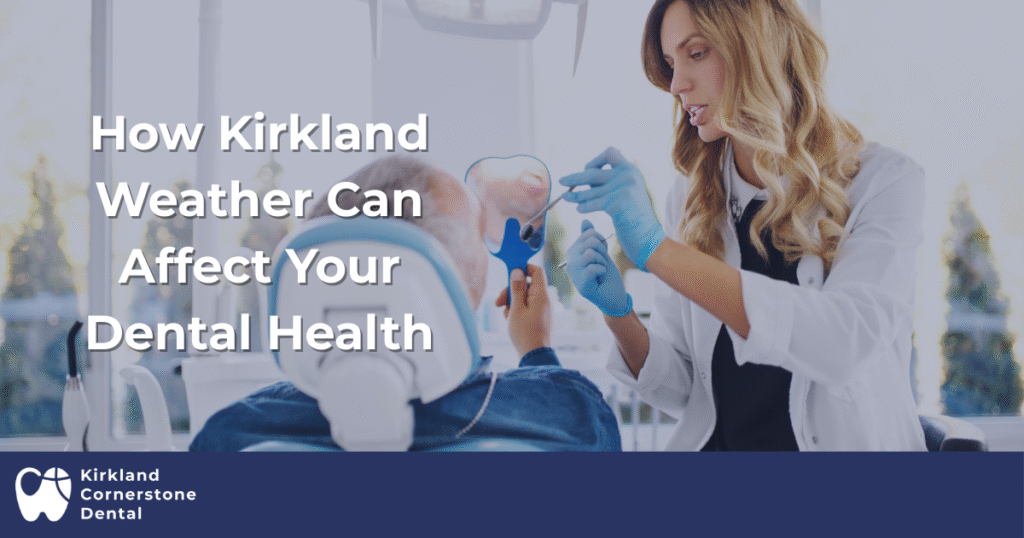Kirkland’s chilly winters may make your teeth feel more sensitive. Breathing in cold air or drinking cold water can cause sharp pain. This happens when the outer layer of your teeth, called enamel, gets worn down. It leaves the inside part of the tooth more open to cold and hot temperatures.
Wearing a scarf over your mouth in cold weather can help. Using toothpaste for sensitive teeth also protects against sharp pains. If the problem doesn’t go away, it’s a good idea to visit a local dentist for help.
Rainy Days May Affect Your Oral Habits
Kirkland gets a lot of rain, especially in the fall and winter. Rainy, gloomy days can sometimes lead people to stay indoors and snack more. If you’re eating more sweets or drinking more coffee or soda, this can raise your risk for cavities.
It’s easy to let healthy habits slip during long stretches of gray weather. But brushing twice a day and flossing daily is still important. Try to stick to a routine even when the weather makes you feel tired or unmotivated.
Dry Indoor Air Can Dry Out Your Mouth
When it gets cold, heaters make indoor air dry—and that can dry out your mouth too. A dry mouth can cause bad breath, increase tooth decay, and let bacteria build up faster.
Drinking more water helps, and a humidifier can add moisture back into the air. If the problem sticks around, Kirkland Cornerstone Dental can recommend rinses or sprays to help keep your mouth healthy and comfortable.
Seasonal Allergies Can Cause Dental Issues
In spring, Kirkland blooms with trees and flowers, but that also means more pollen. Allergies can lead to sinus pressure, which may cause tooth pain. You might feel it in your upper teeth, even though the teeth are fine.
Sinus pain and tooth pain can feel similar. A visit to the dentist can help figure out what’s really going on. They can tell you if the pain is from your teeth or from your sinuses.
Less Sunlight Means Less Vitamin D
Kirkland’s cloudy weather means people may get less sunlight, especially in winter. Sunlight helps your body make vitamin D, which is important for healthy bones and teeth. Low vitamin D can weaken your teeth and gums over time.
You can still get vitamin D from food or supplements. Talk to your doctor or dentist if you think you may be low. They can help you choose the right dose to keep your teeth strong through the darker months.
Cold Weather Can Lead to Teeth Grinding
In colder months, some people grind their teeth or clench their jaw more often. This can be caused by stress, cold air, or tight muscles. Over time, grinding can wear down teeth and lead to jaw pain or headaches.
A custom night guard from a cosmetic dentist kirkland wa can help protect your teeth while you sleep. You can also try warm compresses or gentle jaw stretches to ease tension. If grinding becomes a habit, it’s best to get it checked out early.
See a Dentist If Problems Continue
Weather can affect your teeth in small ways, but small issues can become big problems if ignored. If you notice pain, dry mouth, or other changes in your dental health, it’s best to get checked.
A local dentist can give you advice that fits the Kirkland climate. They’ll help protect your teeth through every season. For more help finding the right care, read A Local’s Guide to Finding the Right Dentist in Kirkland. It offers tips for families and newcomers alike.
Final Thoughts
Kirkland’s weather doesn’t just impact your weekend plans—it can also affect your dental health. Cold air, damp days, and dry indoor heat can all play a role in how your teeth and gums feel.
That’s why it’s smart to stay prepared. If something suddenly feels off, here’s what to do and where to go if you need an emergency dentist in Kirkland. In the meantime, drink plenty of water, brush daily, and don’t ignore unusual symptoms. A little awareness goes a long way toward protecting your smile year-round.

0 Comments
Leave A Comment